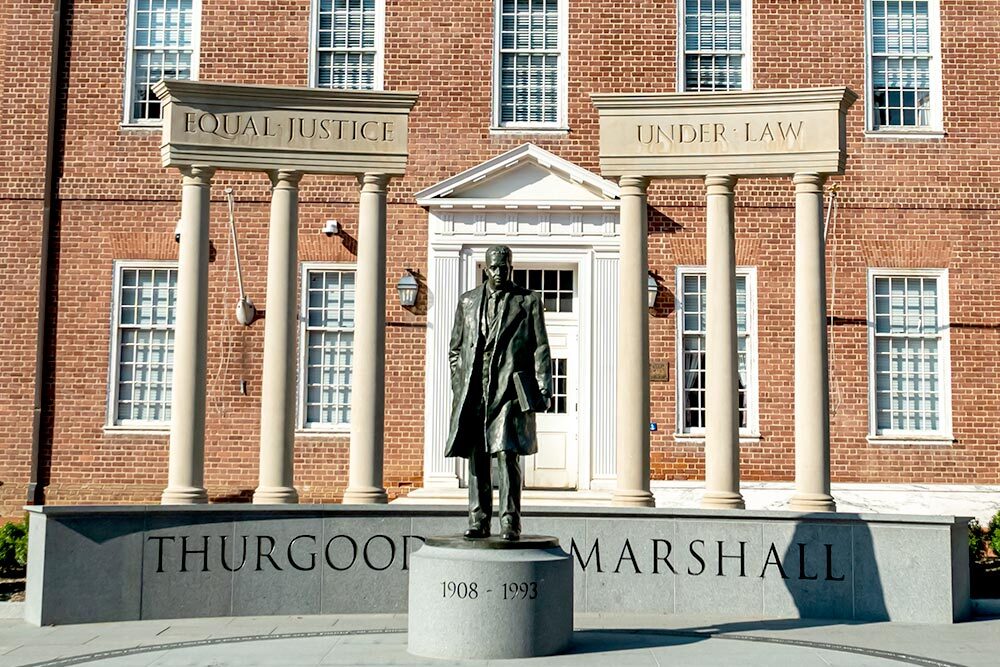Thurgood Marshall

Who was Thurgood Marshall?
In 1954 Thurgood Marshall gained national acclaim when he won the landmark school desegregation case, Brown v. Board of Education. Subsequently, he became the first African American to become a Supreme Court Justice. Marshall was born in Baltimore and began his legal career as a young civil rights attorney in the City. Read more about Thurgood Marshall from Thurgood Marshall College.
What is a Primary Source?
Primary sources are original materials on which other research is based. They are from the time period involved and have not been filtered through interpretation or evaluation.
The Maryland State Library Resource Center has a large collection of primary source materials available, including in the African American Department:
- Vertical file which contains articles from local newspapers, book excerpts, brochures, letters, obituaries, pamphlets, playbills, and political campaign leaflets.
- Ephemera Collection includes flyers, booklets, church histories, newsletters, posters, programs, pamphlets, and other related items.
- Photograph Collection
- Microfilm Collection
Primary Sources about Thurgood Marshall
Legal Documents
Draft of pleadings in the Murray v. University of Maryland case. AFAM XLD3231.M702M89Q.
Reporters
McCready v. Byrd. 195 MD 131 (1949).The Court ruled that the University of Maryland, School of Nursing unconstitutionally denied Esther McCready admission solely because she was an African American.
Murray v. Maryland. 169 MD 478 (1935).The University of Maryland, School of Law was desegregated as the result of the adjudication of this case.
Books
Goldman, Roger. Thurgood Marshall: Justice for All. New York: Carroll & Graf, 1992. KB43.M38G65 1992Recollections of Marshall by former law clerks and people who worked closely with him during his N.A.A.C.P. and Supreme Court years. Also included is an analysis of Marshall's jurisprudence during his time as a Supreme Court Justice and a selection of his Supreme Court opinions and dissents.
Tushnet, Mark V. Thurgood Marshall: His Speeches, Writings, Arguments, Opinions, and Reminiscences. Chicago: Lawrence Hill Books, 2001 KB43.M38A25 2001A collection of Marshall's briefs and oral arguments, writings as a lawyer and judge, judicial opinions, and reminiscences. The Brown v. Board of Education brief is included in this collection.
Newspaper Articles
Banisky, Sandy. "Thurgood Marshall, the Model, Recalls a Baltimore Boyhood." Baltimore Sun, October 24, 1977, p. B1.Marshall comments on memories of growing up in Baltimore.
"Salute to Justice Marshall: A Flawed Constitution" Baltimore Afro-American, May 23, 1987, p. 5.Excerpt from remarks Marshall delivered at the annual seminar of the San Francisco Patent and Trademark Law Association in Maui, Hawaii on May 6, 1987.
Magazine Articles
Allen, Oliver. "Chief Counsel for Equality." Life, June 13, 1955, p. 41.An exposé on Marshall's life and the Brown v. Board of Education case.
Hengstler, Gary A. "Marshalling His Views: Justice's Controversial Comments Break 20-Year Silence." ABA Journal, March 1, 1988, p. 36.Marshall comments on assorted topics, including women's rights and privacy issues.
Marshall, Thurgood. "The Constitution." Essence, September 9, 1987, p.166.Excerpt from speech delivered in Hawaii.
Marshall, Marshall. "Justice Thurgood Marshall's Opinion on the Bakke Case." Crisis, February 1975, pp.45-49.A detailed analysis of the Bakke case from Marshall's perspective.
"The Tension of Change." Time, September 19, 1955, pp. 23-27.Information about Marshall's family history and career up to the point he successfully argued the Brown v. Board of Education case.
If You Need More Help
Contact us through our Ask A Librarian Service, call (410) 396-5430, or write:


